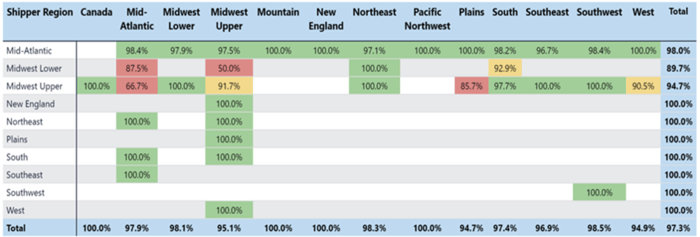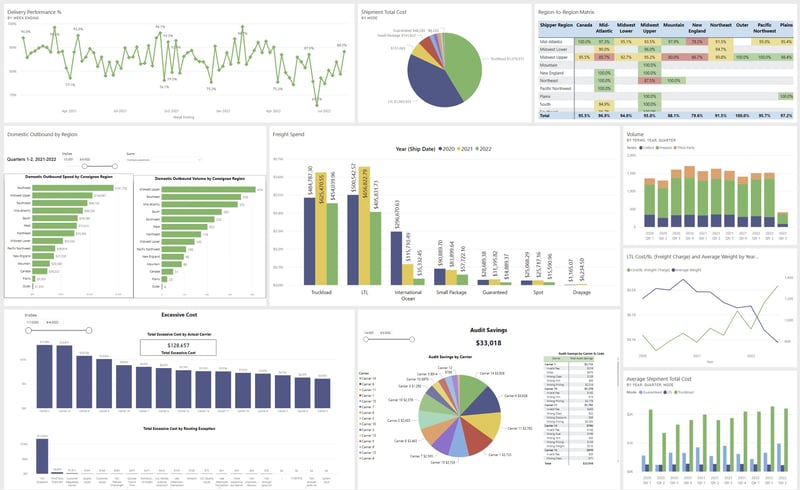In the ever-evolving landscape of supply chain management, the challenges businesses face are no longer just physically moving freight; they're clarity problems. The volatility of today's logistics environment demands a shift from traditional approaches to a more data-driven strategy. IL2000, with its expertise in business intelligence and supply chain consulting, emerges as a beacon guiding companies through the complexities of supply chain analytics and logistics optimization. Let's delve into how IL2000's solutions can transform data insights into actionable strategies for companies’ supply chains.
The Clarity Dilemma: Why Data Alone Isn't Enough
The supply chain decision-making process is fraught with challenges, with the scarcity of time being a significant hindrance. In a world where almost 60% of business decisions are estimated to be non-data-driven, shortcuts like gut instinct and reliance on memory often lead to suboptimal outcomes. The urgency of the clarity dilemma is compounded by the fact that while data is the key to informed decision-making, extracting, verifying, and interpreting it is time-consuming.
Business Intelligence: Bridging the Gap
IL2000's solution to the clarity problem lies in the implementation of Business Intelligence (BI) dashboards. These dashboards simplify complex data into actionable insights, allowing decision-makers to act promptly. By developing dashboards that align with each client’s business objectives, IL2000 ensures that each data point displayed contributes to clarity and guides effective decision-making to overcome their specific challenges.
Examples of BI in Action
1. Recognizing Linear and Cyclical Trends
IL2000's BI dashboards help companies identify trends that may go unnoticed due to human limitations such as memory biases and gut instincts. In one LTL shipping case, IL2000's BI approach revealed a gradual upward trend in freight charges inversely correlated with a decrease in average shipment weight. This insight prompted a closer examination of business rules for freight and identified opportunities for greater shipment consolidation.
The right logistics BI helps you swiftly gain clarity about how your company’s supply chain moves over time, both linearly and cyclically. Building that insight fuels better supply chain decision-making.
2. Discerning Meaningful Patterns
BI aids decision-makers in distinguishing meaningful patterns from false ones. IL2000's visual matrix of delivery reliability data across shipping lanes highlighted specific regions with performance issues. This bird's eye perspective allowed the logistics team to quickly drill down to the lane level for troubleshooting, resulting in a more efficient outcome. BI equips you to discern meaningful patterns from those that can be ignored. Gaining that clarity means you can formulate targeted plans in less time and with fewer resources.
BI equips you to discern meaningful patterns from those that can be ignored. Gaining that clarity means you can formulate targeted plans in less time and with fewer resources.
3. Separating Fear from Uncertainty
The role of fear in decision-making is a significant challenge, often leading to negativity bias and loss aversion. Robust BI adds value by quantifying the unknown, enabling companies to more accurately assess what they don't know about the future. In the example above, where we talked about recognizing a gradual shift in shipment weight, a valuable next step in analyzing that problem could be to place a dollar figure on exactly how much would be gained by addressing that gradual trend and how much would be lost by ignoring it.
Accurate and timely supply chain BI allows you to separate fear from the uncertainty that caused it. And in today’s volatile shipping environment, bolstering a company against fear-driven decision-making is as important as knowing when to exercise reasonable caution. Quantifying the unknown is important intellectual capital.
Business Intelligence: A Tool for Good Decision-Making
 In a world where information overload can hinder decision-making, BI isn't about drowning in data but providing clarity. The goal is to equip companies with actionable insights that lead to better supply chain decisions. In current times when the global supply chain is more uncertain than ever, good business intelligence becomes a crucial tool, helping companies:
In a world where information overload can hinder decision-making, BI isn't about drowning in data but providing clarity. The goal is to equip companies with actionable insights that lead to better supply chain decisions. In current times when the global supply chain is more uncertain than ever, good business intelligence becomes a crucial tool, helping companies:
- Recognize linear and cyclical trends.
- Discern meaningful patterns within complex variables.
- Quantify uncertainty, limiting the impact of fear on decision-making.
In a landscape where gut instinct and memory fall short, IL2000's crystal-clear approach to business intelligence ensures a strategic advantage in simplifying supply chain complexity.
For businesses seeking clarity in their supply chain strategy, let’s talk about BI solutions.

